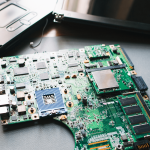Do you know when you should replace your notebook? Are you in the market to buy new notebook? If you ask me, a clear answer to this question is hard to come by.
Computers are incredibly delicate and part of the key what makes them useful is their durability.
That doesn’t mean you should treat your computer like a buffoon, but it does mean that you should find time to do preventive maintenance to keep it in good shape.
How Often Should You Buy a New Laptop?
Contents
The right response is that the 4-5 year mark is an ideal time to upgrade your laptop.
After 5 years, it’s usually a good idea to invest in a new laptop computer.
It may be time for an update if your computer’s hardware begins to fail more frequently, or significantly.
It’s a good idea to retire a laptop that has visibly aged from use, such as a laptop with a cracked screen or a malfunctioning keyboard.
In many situations, you can get a new laptop for less than the cost of fixing an older one.
The first and most crucial thing you should be doing on a regular basis is checking your laptop’s current battery.
Keep an eye on your RAM: If your RAM is too low, your computer will slow down.
Checking the battery life of your laptop should be done at least once a month.
It’s also a good idea to walk around with your laptop and test the battery to make sure it will last while you are doing extensive travel.
If your battery life does not live up to your expectations, it’s time to upgrade.
Signs that You Need to Replace your Laptop
Outdated Security
We don’t need to emphasize how critical it is to keep your data secure.
You don’t need to have a data specialist in order to understand how to protect yourself from data theft and loss.
In fact, you could learn it in just a few minutes.
There are a few simple steps you can take to make sure that your data is safe from hackers and malware.
These steps include regularly changing your passwords, installing an antivirus program, and using a firewall.
You should also use security software that encrypts your personal data. Encryption prevents hackers from gaining access to your files.
By keeping your data safe and protected, you can prevent yourself from being hacked or having your sensitive files stolen.
We are continuously exposed to these threats without really giving it a second thought.
Other threats such as phishing and ransomware are occurring more and more frequently and are beginning to affect even our computers and smart devices.
This, of course, isn’t good.
However, these threats are becoming more apparent to the public, which means more and more people are learning how to protect themselves. Unfortunately, this isn’t always enough.
When I Install New Software, It Doesn’t Work
Even though your laptop is turned on, it may be ineffective: If your laptop has not been sufficiently cleaned by a professional, or if it is not regularly cleaned, you could be dealing with serious computer problems.
Dust, dirt and grime can cause your laptop to fail.
You should probably think seriously about doing so if your computer has nothing at all to do with the hardware.
Sometimes the hardware is to blame, but other times software may be the culprit.
One good way to determine if your hardware is to blame is to run a program that requires additional memory, such as Photoshop, and see if the computer responds well enough to function.
If the computer stalls or crashes, the memory is probably the culprit. While it is not unheard of for a computer to give you trouble when trying to install new hardware, it’s usually not a huge deal.
As long as you remember to back up any data, you can re-install Windows or MacOS and it should work just fine.
Unexpectedly, the laptop shuts itself off.
Overheating is another reason that it’s time for a replacement.
A laptop that is overheating may not shut down immediately, but your documents and other data may be affected.
This occurs when the laptop overheats and shuts down to cool in order to protect the internal components.
When your laptop shuts down, it usually means that it will beep several times before it shuts off completely. When you turn the your laptop on again, it will do a cold boot.
This is a procedure that your computer will have to go through in order to start up. During a cold boot, your computer will restart its main kernal and operating system from scratch.
System Runs Low
It’s time to replace your laptop if it’s constantly taking longer than normal for Windows to start up and shut down.
You may also figure this out when your laptop starts to experience other annoyances, such as sluggish performance, random crashes, and random restarts.
If you’ve been using the same laptop for a long time, it’s likely that it’s starting to run slow.
You’ll probably notice that your computer takes longer to do things that used to be easy.
If you’re only using your computer to do simple tasks such as checking emails or surfing the web, this slowdown isn’t going to bother you.
However, if you’re using your notebook to do more advanced tasks, like designing websites or editing videos, you might not be able to wait around for a new notebook.
Things don’t suddenly slow down, but you’ll notice your laptop getting a lot slower over time.
It’s critical that you pay attention to these signs because if you don’t, you could end up losing your prized data.
The first step in replacing your laptop is to get in touch with your hosting provider, if you have one.
Display quality
The quality of your screen is the last factor I’d consider when deciding whether it’s time for a new computer.
If you’ve noticed that your computer’s display flickers, or has pixels that don’t have a color or appear to be broken, it could be a sign that you should invest in a new display.
You may want to consider getting an IPS display or getting a lower-end monitor that doesn’t use an LED-backlit display.
If your laptop’s display starts to flicker or have dead pixels, it may be time to get a new one. Over time, the screen of your laptop is going to experience damage.
The screen can display dark or white spots, or it may end up looking stretched. It can be uncomfortable to use your laptop when the screen is damaged or distorted.
Desktop displays are more durable than laptop displays.
5 year rule
You’ll want to check in three years to see how far the components have degraded.
Some people believe that there comes a point where a laptop has aged past the point where it can still be used properly.
For them, this could be indicated by certain physical conditions, such as sticky keyboards or screens that are damaged.
However, it is possible to determine this objectively. First, you have to be honest.
Do not waste your time thinking about different ways in which an old laptop could still be used, such as side projects.
Instead, focus on how the device is currently performing.
If you are having trouble using your laptop, it is a good idea to consider replacing it.
Also Read: How Big Is a 14 Inch Laptop?
Conclusion
It’s a good idea to know that there are certain signs that you should replace your laptop.
One of the most common is battery life.
Although it may not seem of much importance to some, it can be very convenient to be able to use your computer without worrying about having to replace the battery every day.
For a long time after your initial investment, your laptop should last for about 5 to 6 years.
However, this does not always imply that you should update, and some people can hold onto their computers for quite a while.
Although Macbooks have a longer shelf life than a majority of laptops, Microsoft’s Thinkpads and other models may last for several years after purchase.
Old computers aren’t always bad; they can still get the job done just fine.
So be sure you really need to buy a new one, as well as if you buy a used one, make sure it’s in good working condition.




